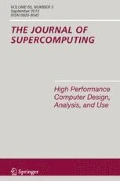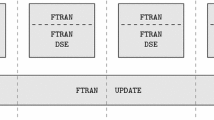Abstract
Minimum-cost flow problems widely exist in graph theory, computer science, information science, and transportation science. The network simplex algorithm is a fast and frequently used method for solving minimum-cost flow problems. However, the conventional sequential algorithms cannot satisfy the requirement of high-computational efficiency for large-scale networks. Parallel computing has resulted in numerous significant advances in science and technology over the past decades and is potential to develop an effective means to solve the computational bottleneck problem of large-scale networks. This paper first analyzes the parallelizability of network simplex algorithm and then presents a multi-granularity parallel network simplex algorithm (MPNSA) with fine- and coarse-granularity parallel strategies, which are suitable for shared- and distributed-memory parallel applications, respectively. MPNSA is achieved by message-passing interface, open multiprocessing, and compute unified device architecture, so that it can be compatible with different high-performance computing platforms. Experimental results demonstrated that MPNSA has very great accelerating effects and the maximum speedup reaches 18.7.










Similar content being viewed by others
References
Rao L, Liu X, Xie L, Liu W (2010) Minimizing electricity cost: optimization of distributed internet data centers in a multi-electricity-market environment. In: INFOCOM, 2010 Proceedings IEEE. IEEE, pp 1–9
Zhao S, Sun X, Chen J, Duan Z, Zhang Y, Zhang Y (2018) Relational granulation method based on quotient space theory for maximum flow problem. Inf Sci. https://doi.org/10.1016/j.ins.2018.12.009
Han S, Peng Z, Wang S (2014) The maximum flow problem of uncertain network. Inf Sci 265:167–175
Chiaraviglio L, Mellia M, Neri F (2012) Minimizing ISP network energy cost: formulation and solutions. IEEE/ACM Trans Netw 20(2):463–476
Basten RJI, Van der Heijden MC, Schutten JMJ (2011) Practical extensions to a minimum cost flow model for level of repair analysis. Eur J Oper Res 211(2):333–342
Jin M, Granda-Marulanda NA, Down I (2014) The impact of carbon policies on supply chain design and logistics of a major retailer. J Clean Prod 85:453–461
Xie F, Jia Y, Jia R (2012) Algorithm for minimum cost maximum flow in transportation network. J Converg Inf Technol 7(7):165–173
Ahuja RK, Magnanti TL, Orlin JB (1993) Network flows: theory, algorithms and applications. Prentice-Hall, Englewood Cliffs
Edmonds J, Karp RM (1972) Theoretical improvements in algorithmic efficiency for network flow problems. J ACM 19(2):248–264
Goldberg AV, Tarjan RE (1989) Finding minimum-cost circulations by canceling negative cycles. J ACM 36(4):873–886
Sokkalingam PT, Ahuja RK, Orlin JB (2000) New polynomial time cycle-canceling algorithms for minimum-cost flows. Networks 36:53–63
Goldberg A, Tarjan R (1987) Solving minimum cost flow problem by successive approximation. In: Proceedings of the Nineteenth Annual ACM Symposium on Theory of Computing. ACM, pp 7–18
Orlin JB (1997) A polynomial time primal network simplex algorithm for minimum cost flows. Math Program 78(2):109–129
Goldfarb D, Hao JX (1990) A primal simplex algorithm that solves the maximum flow problem in at most nm pivots and O(n2m) time. Math Program 47(1–3):353–365
Ciupala L (2006) A deficit scaling algorithm for the minimum flow problem. Sadhana 31(3):227–233
Holzhauser M, Krumke SO, Thielen C (2016) On the complexity and approximability of budget-constrained minimum cost flows. arXiv preprint arXiv:1607.02282
Armstrong RD, Jin ZY (1997) A new strongly polynomial dual network simplex algorithm. Math Program 78(2):131–148
Eusebio A, Figueira JR, Ehrgott M (2009) A primal-dual simplex algorithm for bi-objective network flow problems. 4OR 7(3):255–273
Caliskan C (2008) A double scaling algorithm for the constrained maximum flow problem. Comput Oper Res 35(4):1138–1150
Holzhauser M, Krumke SO, Thielen C (2017) A network simplex method for the budget-constrained minimum cost flow problem. Eur J Oper Res 259(3):864–872
Çalışkan C (2011) A specialized network simplex algorithm for the constrained maximum flow problem. Eur J Oper Res 210(2):137–147
Hwu WM (2014) What is ahead for parallel computing. J Parallel Distrib Comput 74(7):2574–2581
Sato M (2002) OpenMP: parallel programming API for shared memory multiprocessors and on-chip multiprocessors. In: Proceedings of the 15th International Symposium on System Synthesis. ACM, pp 109–111
Kirk D (2007) NVIDIA CUDA software and GPU parallel computing architecture. In: ISMM, vol 7, pp 103–104
Buck I (2007) GPU computing: programming a massively parallel processor. In: 2007. CGO’07. International Symposium on Code Generation and Optimization. IEEE, p 17
Tziritas N, Khan SU, Xu CZ, Hong J (2012) An optimal fully distributed algorithm to minimize the resource consumption of cloud applications. In: 2012 IEEE 18th International Conference on Parallel and Distributed Systems (ICPADS). IEEE, pp 61–68
Tziritas N, Khan SU, Xu CZ, Loukopoulos T, Lalis S (2013) On minimizing the resource consumption of cloud applications using process migrations. J Parallel Distrib Comput 73(12):1690–1704
Bertsekas DP, Castanon DA (1993) Parallel primal–dual methods for the minimum cost flow problem. Comput Optim Appl 2(4):317–336
Beraldi P, Guerriero F (1997) A parallel asynchronous implementation of the ε-relaxation method for the linear minimum cost flow problem. Parallel Comput 23(8):1021–1044
Beraldi P, Guerriero F, Musmanno R (1997) Efficient parallel algorithms for the minimum cost flow problem. J Optim Theory Appl 95(3):501–530
Beraldi P, Guerriero F, Musmanno R (2001) Parallel algorithms for solving the convex minimum cost flow problem. Comput Optim Appl 18(2):175–190
Imai H, Iwano K (1990) Efficient sequential and parallel algorithms for planar minimum cost flow. In: Asano T, Ibaraki T, Imai H, Nishizeki T (eds) Algorithms. SIGAL 1990. Lecture Notes in Computer Science, vol 450. Springer, Berlin, Heidelberg, pp 21–30
Orlin JB, Stein C (1993) Parallel algorithms for the assignment and minimum-cost flow problems. Oper Res Lett 4(14):181–186
Andrzej L, Mia P (2012) A fast parallel algorithm for minimum-cost small integral flows. In: Euro-Par 2012 Parallel Processing. Springer, Berlin, pp 688–699
Lingas A, Persson M (2015) A fast parallel algorithm for minimum-cost small integral flows. Algorithmica 72(2):607–619
Yarmish G, Slyke R (2009) A distributed, scaleable simplex method. J Supercomput 49(3):373–381
Ploskas N, Samaras N, Margaritis K (2013) A parallel implementation of the revised simplex algorithm using OpenMP: some preliminary results. In: Optimization Theory, Decision Making, and Operational Research Applications, Springer Proceedings in Mathematics and Statistics, vol 31, pp 163–175
Lalami ME, Boyer V, El-Baz D (2011) Efficient implementation of the simplex method on a CPU–GPU system. In: Proceedings of the 2011 IEEE International Symposium on Parallel and Distributed Processing Workshops and PhD Forum, Washington DC, 16–20 May 2011, pp 1999–2006
Bieling J, Peschlow P, Martini P (2010) An efficient GPU implementation of the revised simplex method. In: Proceedings of the 24th IEEE International Parallel and Distributed Processing Symposium, 19–23 April 2010, Atlanta, pp 1–8
Meyer X, Albuquerque P, Chopard B (2011) A MultiGPU implementation and performance model for the standard simplex method. In: Proceedings of the 1st International Symposium and 10th Balkan Conference on Operational Research, 22–25 September 2011, Thessaloniki, pp 312–319
Tar P, Stágel B, Maros I (2017) Parallel search paths for the simplex algorithm. CEJOR 25(4):967–984
Hall JAJ, McKinnon KIM (1998) ASYNPLEX, an asynchronous parallel revised simplex algorithms. Ann Oper Res 81:27–50
Klabjan D, Johnson EL, Nemhauser GL (2000) A parallel primal–dual simplex algorithm. Oper Res Lett 27(2):47–55
Lubin M, Hall JAJ, Petra CG, Anitescu M (2013) Parallel distributed-memory simplex for large-scale stochastic LP problems. Comput Optim Appl 55(3):571–596
Thulasiraman K, Chalasani RP, Comeau MA (1993) Parallel network dual simplex method on a shared memory multiprocessor. In: Proceedings of the Fifth IEEE Symposium on Parallel and Distributed Processing, 1993. IEEE, pp 408–415
Mamalis B, Perlitis M (2016) A hybrid parallelization scheme for standard simplex method based on CPU/GPU collaboration. In: Proceedings of the 20th Pan-Hellenic Conference on Informatics, pp 1–6
Huangfu Q, Hall JJ (2018) Parallelizing the dual revised simplex method. Math Program Comput 10(1):119–142
Zhong Z, Feng M, Liu D (2015) Parallelization of revised simplex algorithm on GPUs. In: 2015 International Conference on Network and Information Systems for Computers. IEEE, pp 349–353
He L, Bai H, Jiang Y, Ouyang D, Jiang S (2018) Revised simplex algorithm for linear programming on GPUs with CUDA. Multimed Tools Appl 77(22):30035–30050
Goldberg AV, Tarjan RE (1988) A new approach to the maximum flow problem. J ACM 35(4):921–940
Harel D, Tarjan RE (1984) Fast algorithms for finding nearest common ancestors. SIAM J Comput 13(2):338–355
Eppstein D (1994) Clustering for faster network simplex pivots. In: SODA, pp 160–166
Ahuja RK, Orlin JB (1996) Use of representative operation counts in computational testing of algorithms. Informs J Comput 8(3):318–330
Ahuja RK, Orlin JB, Sharma P, Sokkalingam PT (2002) A network simplex algorithm with O(n) consecutive degenerate pivots. Oper Res Lett 30(3):141–148
Cormen TH et al (2001) Introduction to algorithms. MIT Press, Cambridge
Kelly DJ, ONeill GM (1991) The minimum cost flow problem and the network simplex solution method. Doctoral dissertation, University College Dublin, Graduate School of Business
Badics T, Boros E, Cepek O (1993) Implementing a new maximum flow algorithm. In: Johnson DS, McGeoch CC (eds) Network flows and matching: first DIMACS implementation challenge, DIMACS Series in Discrete Mathematics and Theoretical Computer Science, vol 12. American Mathematical Society, Providence
Acknowledgements
This work was supported by the Strategic Priority Research Program of the Chinese Academy of Sciences (No. XDA19030301); the National Natural Science Foundation of China (No. 41701452 and 41974006); the Natural Science Foundation of Guangdong (No. 2019A1515011501); and the Shenzhen Scientific Research and Development Funding Program (No. KQJSCX20180328093453763, JCYJ20180305125101282).
Author information
Authors and Affiliations
Corresponding author
Ethics declarations
Conflict of interest
On behalf of all authors, the corresponding author states that there is no conflict of interest.
Additional information
Publisher's Note
Springer Nature remains neutral with regard to jurisdictional claims in published maps and institutional affiliations.
Electronic supplementary material
Below is the link to the electronic supplementary material.
Rights and permissions
About this article
Cite this article
Jiang, J., Chen, J. & Wang, C. Multi-granularity hybrid parallel network simplex algorithm for minimum-cost flow problems. J Supercomput 76, 9800–9826 (2020). https://doi.org/10.1007/s11227-020-03227-9
Published:
Issue Date:
DOI: https://doi.org/10.1007/s11227-020-03227-9




